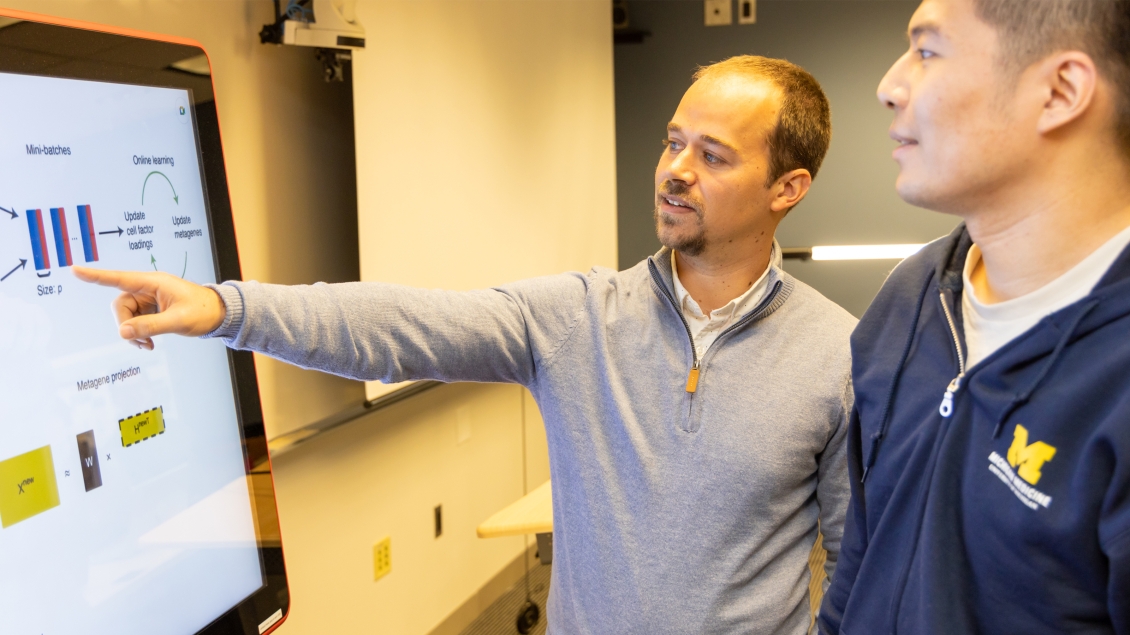-
Bioinformatics -
Biological Chemistry -
Cancer Biology -
Cell & Developmental Biology -
Cellular & Molecular Biology -
Genetics and Genomics -
Health Infrastructures & Learning Systems -
Immunology -
Microbiology & Immunology -
Molecular, Cellular & Developmental Biology -
Molecular & Cellular Pathology -
Molecular & Integrative Physiology -
Neuroscience -
Pharmacology

Bioinformatics
An all-encompassing, highly interdisciplinary field
Program Overview
The University of Michigan Bioinformatics Graduate Program builds a strong foundation for Master’s and PhD students through comprehensive course offering, research training and mentoring.
Students in our program take courses in advanced math, modeling, statistics, computer programming, machine learning, informatics, comprehensive courses in introductory biology, genomics, proteomics, clinical informatics, environmental health, and much more. They are encouraged to take advantage of the enormous research and teaching resources across U-M.
Our students have an abundance of research opportunities in many subject areas under the mentorship of our 130 affiliated faculty members of the Center for Computational Medicine and Bioinformatics (CCMB). These faculty are from U-M Medical School, College of Engineering, College of Literature, Arts and Sciences, School of Public Health, School of Nursing, and School of Information.
In 2023, the Bioinformatics Graduate Program maintains a student body of 87 PhD students, and over 120 Master's students. They are mentored by the 44 DCMB faculty and the 130 CCMB faculty. Faculty members with biological and more quantitative expertise are both well represented.
The Bioinformatics Graduate Program was created in 1999 and is housed in the Department of Computational Medicine and Bioinformatics (DCMB).
Bioinformatics offers an extensive range of research opportunities, from applications for clinical medical problems and specific diseases to computational work on synthetic biological systems. There are very active groups in:
- Artificial Intelligence (AI) and machine learning
- Genomics, regulatory genomics and epigenomics
- Protein structure, proteomics, and alternative splicing
- Multi-“omics” integrative bioinformatics
- Systems biology and networks analysis
- Biomedical data science, translational bioinformatics and pharmacogenomics
- Methodological development in computational biology
- Applications to complex genetic diseases
- 4D Nucleome
- Single Cell Analysis
- Signal/Image Processing and Machine Learning
Bioinformatics has had NIH supported training grants since 2005. Our students are eligible for a wide range of other training grant support related to more specific areas of research, such as genomics or cancer proteomics.
Coursework
Students are required to take courses in each of the following areas:
- Introductory Bioinformatics
- Computing & Informatics
- Probability & Statistics
- Molecular Biology
- Bioinformatics 602 (Journal Club) taken once in the first year.
- Bioinformatics 603 (Journal Club) taken once; students present papers for discussion
- Research Responsibility and Ethics course (PIBS 503)
- One Advanced Bioinformatics course offered or cross-listed by the Bioinformatics Graduate Program
- One additional Advanced Bioinformatics course in any program
Details about courses available in each of these areas can be found on the department website. Courses may be offered by Bioinformatics or other units.
Attendance at weekly seminars is also expected. Offered seminars include a weekly series of invited guest speakers, “Tools & Tech” presentations that highlight a tool or technology, either under development or in current use, and BISTRO, a lively seminar where students present their ongoing research.
Preliminary Examination
Students take a preliminary exam in their second year, usually at the end of the 3rd or 4th term. The preliminary exam should show both creativity and skill, and should not be identical to the student’s thesis work. The aims of the examination are two-fold. The first aim is to demonstrate that students have developed the ability to analyze a scientific problem and develop appropriate strategies to carry out a research plan. The second aim is to demonstrate that students have enough Bioinformatics knowledge needed to carry out their thesis research. Students sometimes develop their prelim proposals into a paper and/or a thesis chapter later.
Teaching Requirement
Teaching, in Bioinformatics or in other departments, is encouraged and expected for at least one term from most Bioinformatics students. Individual circumstances such as English language ability, interest, and funding situation of the mentor are considered.
Expected Length of Program
The expected time to PhD graduation is 5 to 6 years.
Approximately 8-15 new students join the PhD program each year. Each term, contact between faculty and students is encouraged through research events & social gatherings. Given the interdisciplinary nature of the program, students are encouraged to develop and pursue their own research interests. In an effort to support students’ academic growth, the department and other units (such as Rackham Graduate School) offer funding to assist students with conference participation or workshop attendance.
Approximately 50% of program alumni choose academia, while others with go into industry with many working at biotechnology companies. Aware of this, current students are provided opportunities to meet with guest seminar speakers or visitors from industry. In addition, outside internships are encouraged if related to a student’s research as they have proven to be valuable experiences.
The program supports student-led initiatives that are focused on building community such as student organized social activities, a pre-Thanksgiving dinner, and group run in the local marathon. Separately, Bioinformatics coordinates an annual off-site weekend retreat and an annual picnic.
DCMB welcomes and supports several student organizations:
- The Bioinformatics Graduate Student Association (BGSA)
- The Bioinformatics Black Student Union (BBSU)
- The Data Analysis Networking Group (DANG!)
- DCMB Girls Who Code Club
- PACCAR
Alumni from the Bioinformatics Graduate Program pursue successful careers in academia, biotechnology and biomedical research in industry and government. Most of them are employed immediately after graduation.
Learn more about the Department of Computational Medicine and Bioinformatics.